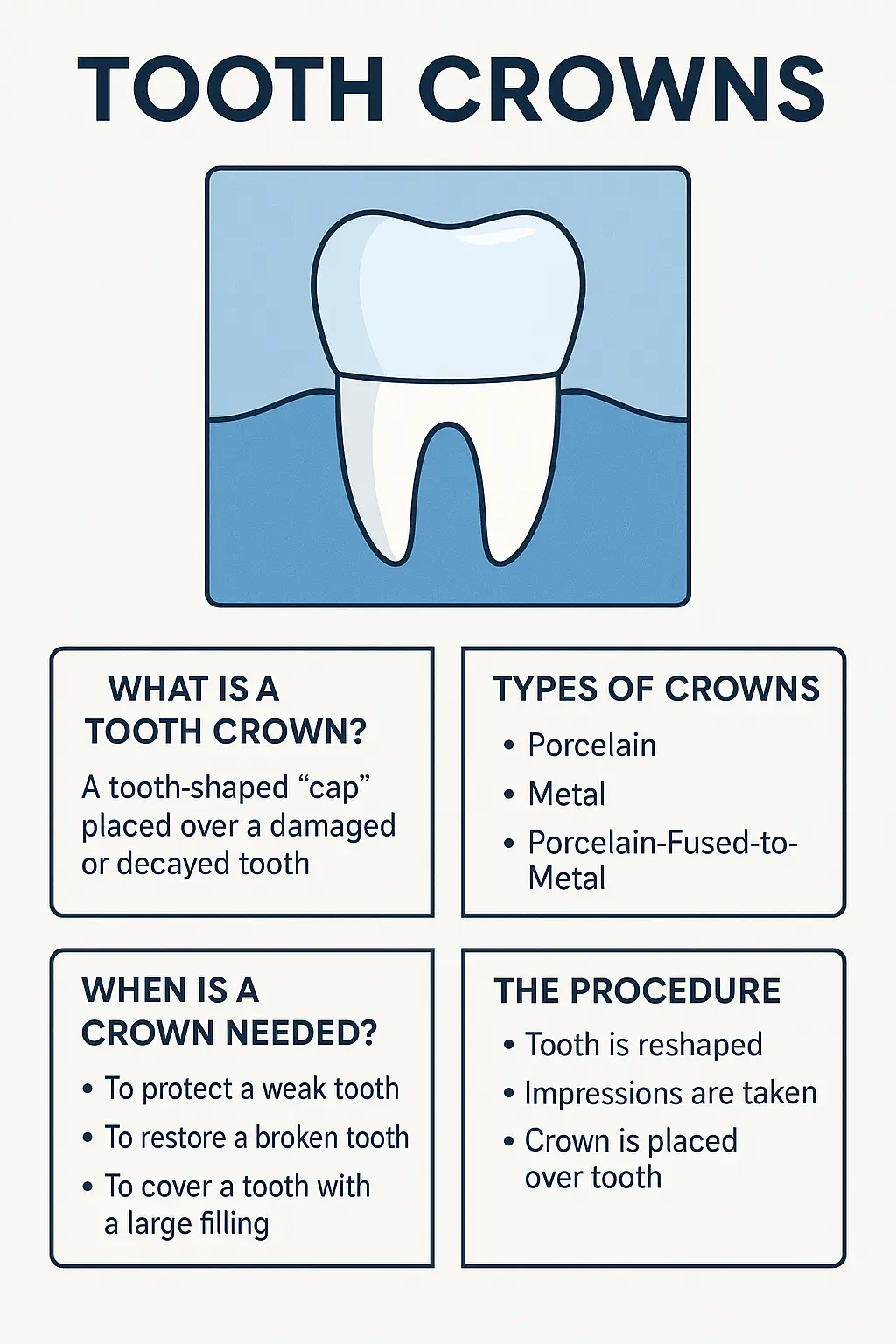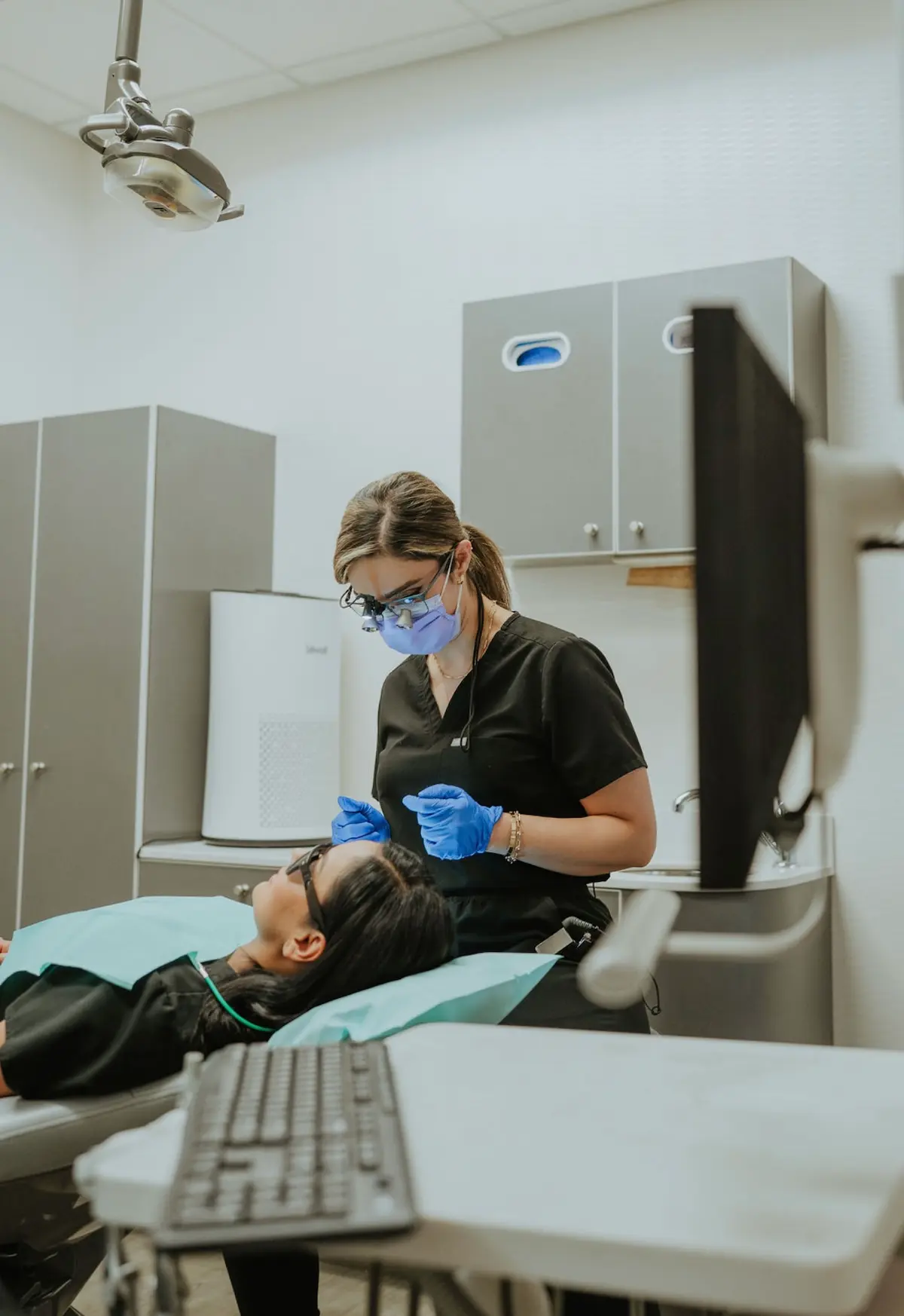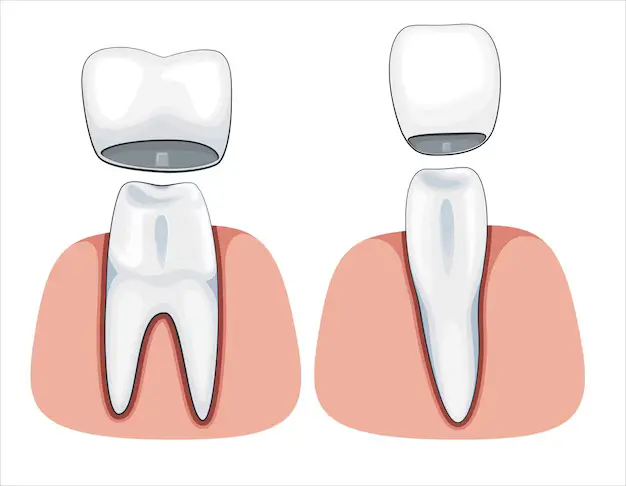When your dentist mentions you need a "tooth cap," you might wonder exactly what this means and whether it's the right solution for your dental treatment. A tooth cap, also known as a dental crown, is one of the most effective ways to restore a damaged tooth while preserving your natural smile.
Whether you're dealing with a cracked tooth, extensive decay, or want to improve your smile's appearance, understanding tooth caps helps you make informed decisions about your dental care.
What Is a Tooth Cap?
A tooth cap is a custom made, tooth shaped cover that completely encases a damaged or weakened tooth above the gum line. The terms "tooth cap," "dental cap," and "dental crown" are interchangeable as they all describe the same treatment.
Unlike fillings that only fill cavities, tooth caps provide complete coverage and protection. When a tooth is too damaged for a simple filling but doesn't require extraction, a cap saves the tooth while restoring full function.
Primary functions include:
- Protection: Shield weakened teeth from further damage
- Restoration: Return normal shape and function to damaged teeth
- Strength: Provide structural support for compromised teeth
- Aesthetics: Improve appearance of discolored or misshapen teeth
- Longevity: Extend the life of natural teeth
When Do You Need a Tooth Cap?
Your (dentist)[/] may recommend a tooth cap in several situations:
Severe Tooth Decay: When cavities are too large for fillings, caps provide comprehensive protection and reinforce remaining tooth structure.
Cracked or Fractured Teeth: Caps hold cracked teeth together, preventing further damage while restoring normal function.
After Root Canal Treatment: Following root canal therapy, teeth become brittle and need cap protection, especially back teeth handling chewing forces.

Large Existing Fillings: When oversized fillings fail, caps provide better long term solutions than replacement fillings.
Cosmetic Enhancement: Caps address severe discoloration, misshapen teeth, medication staining, or spacing issues.
Protecting Weak Teeth: Preventive caps protect teeth weakened by genetics, previous dental work, or medical treatments.
Supporting Dental Bridges: Adjacent teeth often need caps to anchor dental bridges.
Types of Tooth Caps: Materials and Options
Modern dentistry offers several tooth cap materials, each with distinct advantages:
Porcelain Caps
Best for front teeth with superior color matching and translucency that mimics natural enamel. Stain resistant and metal free, ideal for patients with metal sensitivities. May chip under extreme pressure and costs more than other materials.
Porcelain Fused to Metal (PFM) Caps
Balanced option combining metal strength with porcelain aesthetics. Suitable for front and back teeth with proven success rates. Less expensive than all porcelain but may show dark lines at gum line over time.
Metal Caps (Gold/Alloy)
Exceptional durability for back teeth. Require minimal tooth removal, gentle on opposing teeth, and resist wear. Higher material costs and visible metallic appearance limit use to back teeth.
Zirconia Caps
Advanced technology combining maximum strength with excellent aesthetics. Biocompatible, can be made very thin, suitable for all teeth. Higher cost and may require special removal techniques.
Composite Resin Caps
Temporary solutions with lower cost and quick fabrication. Limited durability and prone to staining make them suitable primarily for temporary use.
Tooth Cap Procedure: What to Expect
The dental crown procedure typically requires two appointments spaced 2-3 weeks apart:
First Appointment: Preparation
Examination and Planning: Digital X-rays assess tooth health, followed by material discussion and color matching.
Anesthesia: Local anesthesia ensures complete comfort during preparation.
Tooth Reshaping: Careful removal of damaged structure and contouring to create space for the cap while preserving maximum healthy tooth.
Impressions: Traditional putty or digital scanning captures precise measurements for the laboratory.

Temporary Cap: Acrylic or composite temporary protects the prepared tooth for 2-3 weeks while the permanent cap is crafted.
Laboratory Fabrication
Skilled technicians use digital CAD/CAM technology and precise color matching to create your custom cap.
Second Appointment: Placement
Temporary Removal: The temporary cap is removed and the tooth cleaned.
Fit Verification: Cap fit, color match, and bite alignment are checked before permanent placement.
Permanent Cementation: Special dental cement permanently secures the cap, followed by final adjustments for comfort.
Tooth Cap Cost: Investment in Your Smile
Tooth cap costs vary significantly based on materials and location:
Cost Ranges by Material
- Porcelain: $800 - $1,800 per tooth (best aesthetics for front teeth)
- Porcelain Fused to Metal: $500 - $1,500 per tooth (balanced option)
- Gold/Metal: $1,200 - $2,500 per tooth (maximum durability)
- Zirconia: $1,000 - $2,000 per tooth (advanced technology)
Factors Affecting Price
Location: Urban areas typically cost more than rural locations. Dentist Experience: Specialists may charge premium fees but provide superior results. Additional Procedures: Root canals ($800-$1,500), core buildups ($200-$400), or gum treatment ($100-$300) increase total costs.
Insurance and Financing
Insurance Coverage: Most plans cover 50-80% for restorative caps, with $1,000-$2,000 annual maximums. Payment Options: In house plans, CareCredit financing, dental savings plans, and HSA/FSA accounts help manage costs.
Tooth Cap Care and Maintenance
Proper tooth cap care maximizes lifespan (10-15+ years) and maintains optimal oral health.
Daily Care
Brushing: Use soft-bristled toothbrush with fluoride toothpaste, brushing gently around cap margins. Flossing: Daily flossing with gentle up-and-down motions. Consider floss threaders or water flossers. Rinse: Antibacterial mouthwash prevents gum disease around capped teeth.
Foods to Avoid
Hard Foods: Ice, hard candies, nuts, popcorn kernels, crusty bread Sticky Foods: Caramel, taffy, sticky candies, dried fruits Temperature: Very hot/cold foods may cause initial sensitivity
Professional Maintenance
Regular Visits: Bi-annual cleanings and examinations for early problem detection Specialized Cleaning: Hygienists use special tools to clean around caps safely
Warning Signs
Immediate Attention: Sharp pain when biting, loose cap, visible cracks, persistent sensitivity Gradual Changes: Increasing sensitivity, dark lines at gum line, bite changes, bad taste
Protection
Night Guards: Protect caps from teeth grinding Sports Guards: Shield caps during athletic activities Habit Changes: Avoid using teeth as tools

Tooth Cap vs. Other Dental Restorations
Understanding how dental caps compare to alternatives helps explain treatment recommendations:
Cap vs. Filling
Fillings work for: Small-moderate cavities with sufficient healthy tooth structure remaining Caps better for: Large cavities, weakened teeth, comprehensive protection needs
Cap vs. Veneer
Veneers: Minimal preparation, excellent front-tooth aesthetics, lower cost Caps: Complete protection, suitable for heavily restored teeth, more durable
Cap vs. Implant
Implants: Don't affect adjacent teeth, potentially longer lifespan, preserve jawbone Caps: Preserve natural root, lower cost, faster treatment, no surgery required
Common Tooth Cap Problems and Solutions
Tooth cap complications are rare, but recognizing issues early helps ensure prompt treatment:
Common Issues
Sensitivity: Temporary temperature sensitivity is normal initially. Use desensitizing toothpaste and contact your dentist if sensitivity worsens.
Cap Damage: Small chips may be repairable, large chips or cracks typically require replacement. Loose caps need immediate attention.
Gum Problems: Recession can expose margins, inflammation usually resolves with improved hygiene and professional treatment.
Bite Issues: High caps or bite changes require immediate adjustment to prevent jaw pain and premature wear.
Long term Changes: Color mismatches may develop as natural teeth change color, excessive wear may indicate bite problems or grinding habits.
Quick Takeaways
• Tooth caps and dental crowns are identical - both terms describe the same restorative treatment
• Material choice matters - porcelain offers best aesthetics, zirconia provides maximum strength, gold delivers exceptional longevity
• Two-appointment process is standard - tooth preparation, temporary placement, and permanent installation 2-3 weeks later
• Investment ranges from $800-$3,000 per tooth with insurance typically covering 50% for restorative purposes
• Proper care extends lifespan - most caps last 10-15 years with gentle brushing, careful flossing, and avoiding hard foods
Conclusion
Tooth caps represent one of modern dentistry's most versatile solutions for restoring damaged teeth. Whether dealing with extensive decay, cracks, or aesthetic concerns, caps offer durable, natural-looking results lasting decades with proper care.
Success depends on working with an experienced dentist who guides material selection, treatment planning, and maintenance. While the initial investment may seem significant, the long term benefits preserved natural teeth, improved function, and enhanced confidence—provide excellent value.
Every situation is unique. Factors like tooth location, bite forces, aesthetics, and budget determine the optimal approach for your specific needs. If you are in Langley area (contact Spire Dental Care Dentist)[/contact] to discuss your treatment options. We will help you out!





